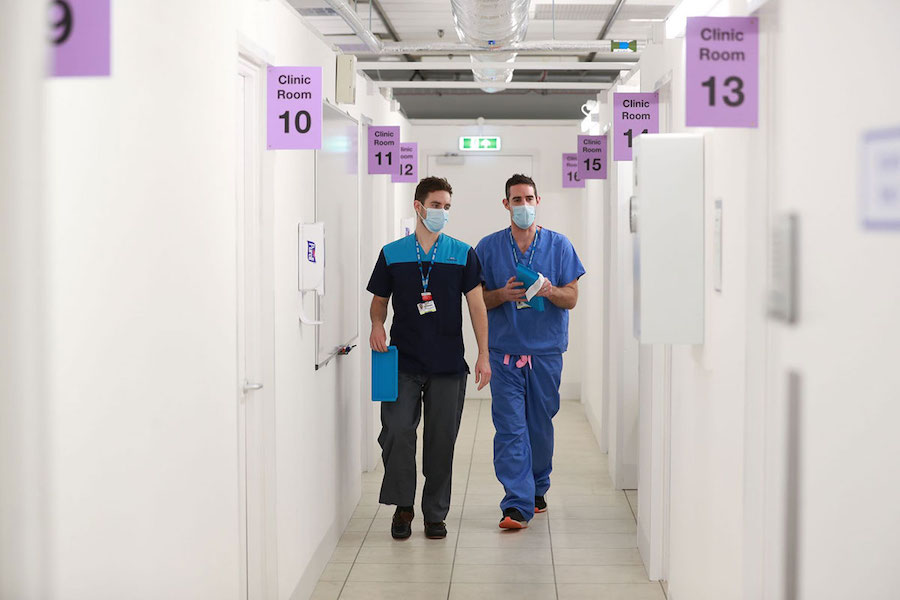Primary & community care / Sustainability
Materials from Nightingale hospitals help build retail-based diagnostics centre
By Andrew Sansom | 10 Jan 2022 | 0
The design team behind the temporary NHS Nightingale emergency hospitals that were deployed at the height of the Covid-19 pandemic in April 2020 has overseen the completion of the first of 40 community NHS diagnostic centres opening in England.
And in an example of sustainability, materials from the demounted Nightingale Hospitals have been reclaimed and reused to build the centre in Dorset, which will act as a one-stop-shop for much needed and overdue checks, scans and tests in the community.
To reduce current pressures on the NHS, design consultancy BDP and its construction and facilities management partner CFES have been working with University Hospitals Dorset NHS Foundation Trust to open a new centre for breast screening and diagnostics in Beales department store, in Poole. Situated in the Dolphin shopping centre, it will also offer testing and assessments for orthopaedics, ophthalmology and dermatology diagnoses.
Planning of the outpatient assessment clinic started in March last year. Taking lessons from the creation of the Nightingale Hospitals at the height of the pandemic and from mass vaccination centres clinically led plans were developed to transform the large shop floor into 2600 square metres of partitioned clinical space. Many of the materials used in the construction came from the Nightingales’ stock, including 1000 plasterboards, more than 200 light fittings, 90 doors and the wash stations.
The project has been led by University Hospitals Dorset NHS Foundation Trust, in partnership with other NHS organisations across Dorset, Beales, and the landlord of the Dolphin Centre, Legal and General. Innova supplied many of the materials used in the build.
“This project is the first of its kind in the country,” said Paul Johnson, architect director at BDP, who also led the design of the Nightingale Hospital in London’s ExCeL centre. “Not only does it support a circular economy by reusing the materials from the emergency Covid-19 hospitals in an existing building, it’s also built on the same collaborative and sustainable methods of design and construction. 
“NHS waiting lists are at an all-time high and through good design, based on imaginative adaptation of space and recycling of equipment, we are creating real solutions to the problem.”
Interdisciplinary approach
Johnson went on to underline how the design consultancy’s interdisciplinary focus is leading it to think wider about societal issues.
“This new centre will help bring true health benefits to the community, reduce pressure on our NHS, and give a welcome boost to the retail sector,” he said. “We’re very proud to be a part of such an impactful and important initiative and hope to deliver this flexible and repeatable solution for another 39 diagnostic centres in original, underutilised spaces across the country.”
The new centres will benefit millions of people by providing earlier diagnostics and more convenient and accessible treatment in communities across the country. The design also contributes to the NHS’s net-zero ambitions by providing multiple tests at one visit, reducing the number of patient journeys, and helping cut carbon emissions and air pollution.
Ashleigh Boreham, deputy director of design and transformation at Dorset Clinical Commissioning Group, said: “We have reached a critical point where we have to manage the backlog and protect the NHS, which has led us to the opening of this centre. Adapting and repurposing unused retail space is going on elsewhere in the country, but to work within this existing centre and create something built simply for the outpatients, for diagnostics and assessment, is quite different – it’s a first.”
Mark Mould, chief operating officer of University Hospitals Dorset, said: “This centre will provide the same levels of clinical care as in our hospitals, but we will be able to see more patients than we currently are able to. The location in the middle of a shopping centre will offer a totally new experience for our patients, with transport links and local facilities. Our army of volunteers will also play a large role improving the patient experience and we thank all of them.”
Rob Doubtfire, managing director at CFES, added: “Working within established relationships in proactive design and build project delivery has delivered real benefits for the NHS for the first of this kind of community diagnostic centre. The use and re-use of materials from Nightingale stock require quick and close engagement from all partners and, once again, we’re pleased to have been a part of this with the NHS and BDP.”
The community diagnostic village in Poole is now open for patients referred for assessments from local GPs.
Organisations involved

